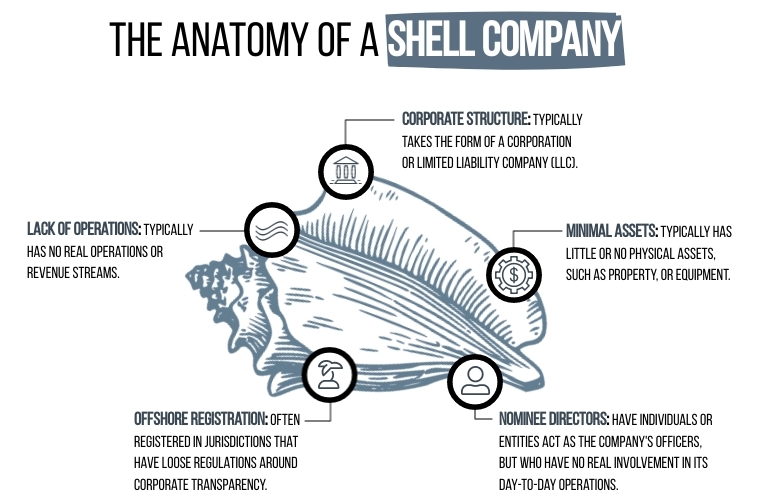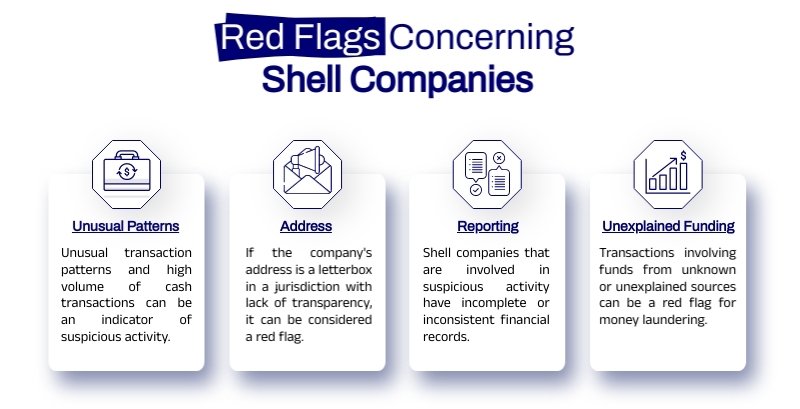The past financial data leaks unveiled by the ICIJ have disclosed close to one million shell companies used for illicit or murky purposes, but the ease and low cost of establishing such entities, coupled with the opacity that such corporate vehicles give to their beneficial owners, makes the problem ongoing and extensive.

The problem has been known for decades. In 2005, FinCEN’s “U.S. Money Laundering Threat Assessment” noted that shell companies are prone to money laundering and other financial crimes as they are “easy and inexpensive to form and operate.” In 2006, the FATF report “The Misuse of Corporate Vehicles, Including Trust and Company Service Providers” painted a similar picture.
Despite years of warnings, cases, and regulations, shell companies continue to be a recurrent headache in the fight against financial crime.
What is a shell company?
A shell company can be defined an entity that only exists on paper and lacks any active operations, resources, or personnel of its own. They have no physical office, with addresses usually linked to a mailbox, and are favored in countries with lax regulatory oversight or in tax havens.
Setting up a shell company is relatively easy, requires only a few hours, and can cost between $100 to a few thousand dollars depending on the country where it is established and on the service used. The founder can appoint a strawman as the director of the company. Lawyers, notaries, and Corporate Service Providers (CSPs) are used to set-up such companies. They can also serve as directors for the entity, if needed.
There are different types of shell companies. These include, but are not limited to:
-
Anonymous shell companies: the ultimate beneficial owner is concealed behind the corporation or a network of connected shell companies in other jurisdictions, providing anonymity and control over the company's resources. They are frequently connected to illegal activities.
Shelf companies: a type of company that has previously been incorporated but has never done business. It is kept until sold to a buyer who can use it to launch a new firm using an already-known company name, avoiding the process of starting a new corporation from scratch.
Special Purpose Entities (SPE): this type of company primarily engages in group financing or holding activities, with few employees and little physical presence in the host economy. Its assets and liabilities include investments made abroad and are frequently used for aggressive tax planning.
Letterbox companies: this type of corporation is registered in one state but operates in another. They can be used to get around labor rules of the nation where the activity is taking place.
Why are shell companies considered a money laundering risk?
The anonymity that shell companies offer makes them vulnerable to abuse by criminals and corrupt individuals. Such companies protect their privacy by keeping their owners' and controllers' identities a secret. They might use fictitious directors or shareholders, intricate ownership structures, and offshore jurisdictions with rules that permit greater anonymity and privacy. In certain jurisdictions, corporations are not compelled to divulge the names of their directors or shareholders.
Shell companies may also add layers of ownership to conceal the underlying structure. With the use of a complex network of shell companies, trusts, and other entities as owners of the company, it makes it challenging for authorities and compliance experts to trace the ownership chain. It becomes even tougher when the companies are registered in different jurisdictions.
Investigations by part of the authorities can be greatly hampered if the shell company is registered in a country that has no bilateral Mutual Legal Assistance Treaty (MLAT) with the jurisdiction of the authority conducting the inquiry. This makes obtaining records impossible. Even if a MLAT is present, the production of documents can take weeks to years, allowing the criminals to disappear.
How are shell companies used for money laundering?
Shell companies can be used during all three stages of the money laundering process.In the placement stage, where illegal funds are introduced in the financial system, shell companies can provide a way to deposit cash or transfer money without disclosing the money's true source. A criminal might, for instance, establish a shell business in a tax haven and utilize it to receive financial deposits that can subsequently be moved to additional shell businesses and then to bank accounts in different nations.
In the layering stage, criminals may use myriads of shell companies across multiple jurisdictions to create chains of confusing transactions meant to hide the source of funds. In 2022, Transparency International discovered an intricate global network of over 130 businesses that transferred more than $820 million out of Russia between 2014 and 2016. It was uncovered that Russian shell companies conducted 123 different transactions with businesses incorporated in the UK, Cyprus, and the Czech Republic for the purchase of non-existent bottle-moulding machines bought at 800 times their market price. The ultimate destination of the funds of this trade-based money laundering scheme remains unclear.
The final integration stage sees criminals use shell companies to reintroduce into the economy the laundered funds to invest in luxury goods or to purchase high-value items. They can be used by criminals to enjoy the profits of their illegal activities without attracting attention. For example, a criminal could use a shell company to hide their identity when buying a luxury yacht or expensive real estate.
What is the legislation concerning shell companies?
In the EU, the Fourth AML Directive required member states to obtain and hold accurate and current information on beneficial ownership in a central register. With the Fifth AMLD of 2018, the register was made public, except for trusts. The accurate and up-to-date information on beneficial ownership is crucial in tracing criminals who hide their identity behind shell companies.
The United Kingdom has strong beneficial ownership legislation with registers for companies, real estate property, and trusts. Bilateral agreements concerning the exchange of beneficial ownership data came into force in July 2017 between the UK and the Crown Dependencies and Overseas Territories. This includes the Isle of Man, the British Virgin Islands, the Cayman Islands, and other places. In accordance with the terms of these agreements, law enforcement in the UK has access to information about a company's beneficial ownership to support investigations.
The UK’s Economic Crime Plan 2019-2022, launched in January of 2019, included the expansion of the Trust Registration Service for trusts from the UK and other non-European Economic Areas that buy property in the UK together with the creation of “new global norm of accessible company beneficial ownership information that is linked across borders.”







